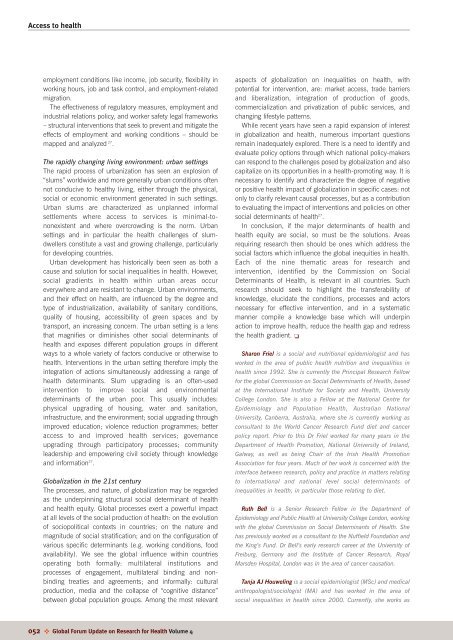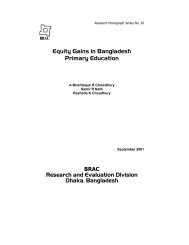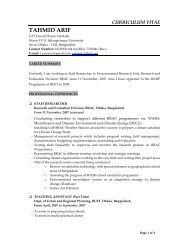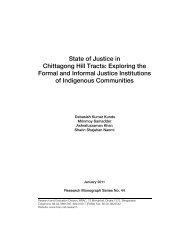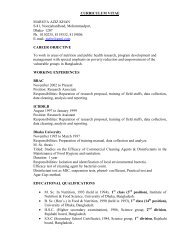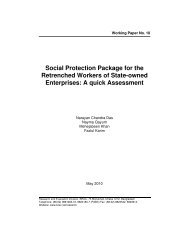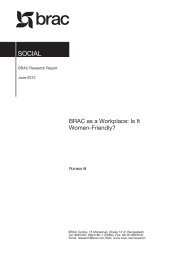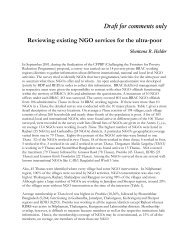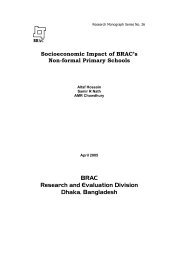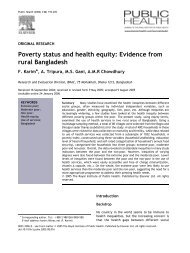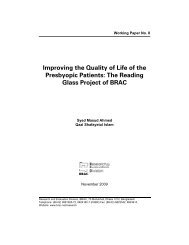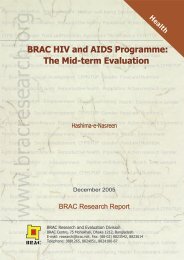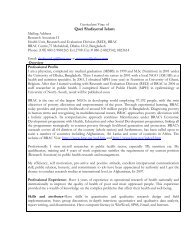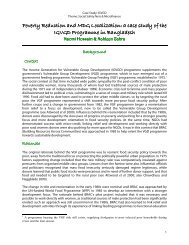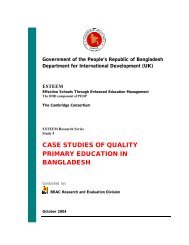Combining health and social protection measures to reach the ultra ...
Combining health and social protection measures to reach the ultra ...
Combining health and social protection measures to reach the ultra ...
Create successful ePaper yourself
Turn your PDF publications into a flip-book with our unique Google optimized e-Paper software.
Access <strong>to</strong> <strong>health</strong><br />
employment conditions like income, job security, flexibility in<br />
working hours, job <strong>and</strong> task control, <strong>and</strong> employment-related<br />
migration.<br />
The effectiveness of regula<strong>to</strong>ry <strong>measures</strong>, employment <strong>and</strong><br />
industrial relations policy, <strong>and</strong> worker safety legal frameworks<br />
– structural interventions that seek <strong>to</strong> prevent <strong>and</strong> mitigate <strong>the</strong><br />
effects of employment <strong>and</strong> working conditions – should be<br />
mapped <strong>and</strong> analyzed 27 .<br />
The rapidly changing living environment: urban settings<br />
The rapid process of urbanization has seen an explosion of<br />
“slums” worldwide <strong>and</strong> more generally urban conditions often<br />
not conducive <strong>to</strong> <strong>health</strong>y living, ei<strong>the</strong>r through <strong>the</strong> physical,<br />
<strong>social</strong> or economic environment generated in such settings.<br />
Urban slums are characterized as unplanned informal<br />
settlements where access <strong>to</strong> services is minimal-<strong>to</strong>nonexistent<br />
<strong>and</strong> where overcrowding is <strong>the</strong> norm. Urban<br />
settings <strong>and</strong> in particular <strong>the</strong> <strong>health</strong> challenges of slumdwellers<br />
constitute a vast <strong>and</strong> growing challenge, particularly<br />
for developing countries.<br />
Urban development has his<strong>to</strong>rically been seen as both a<br />
cause <strong>and</strong> solution for <strong>social</strong> inequalities in <strong>health</strong>. However,<br />
<strong>social</strong> gradients in <strong>health</strong> within urban areas occur<br />
everywhere <strong>and</strong> are resistant <strong>to</strong> change. Urban environments,<br />
<strong>and</strong> <strong>the</strong>ir effect on <strong>health</strong>, are influenced by <strong>the</strong> degree <strong>and</strong><br />
type of industrialization, availability of sanitary conditions,<br />
quality of housing, accessibility of green spaces <strong>and</strong> by<br />
transport, an increasing concern. The urban setting is a lens<br />
that magnifies or diminishes o<strong>the</strong>r <strong>social</strong> determinants of<br />
<strong>health</strong> <strong>and</strong> exposes different population groups in different<br />
ways <strong>to</strong> a whole variety of fac<strong>to</strong>rs conducive or o<strong>the</strong>rwise <strong>to</strong><br />
<strong>health</strong>. Interventions in <strong>the</strong> urban setting <strong>the</strong>refore imply <strong>the</strong><br />
integration of actions simultaneously addressing a range of<br />
<strong>health</strong> determinants. Slum upgrading is an often-used<br />
intervention <strong>to</strong> improve <strong>social</strong> <strong>and</strong> environmental<br />
determinants of <strong>the</strong> urban poor. This usually includes:<br />
physical upgrading of housing, water <strong>and</strong> sanitation,<br />
infrastructure, <strong>and</strong> <strong>the</strong> environment; <strong>social</strong> upgrading through<br />
improved education; violence reduction programmes; better<br />
access <strong>to</strong> <strong>and</strong> improved <strong>health</strong> services; governance<br />
upgrading through participa<strong>to</strong>ry processes; community<br />
leadership <strong>and</strong> empowering civil society through knowledge<br />
<strong>and</strong> information 27 .<br />
Globalization in <strong>the</strong> 21st century<br />
The processes, <strong>and</strong> nature, of globalization may be regarded<br />
as <strong>the</strong> underpinning structural <strong>social</strong> determinant of <strong>health</strong><br />
<strong>and</strong> <strong>health</strong> equity. Global processes exert a powerful impact<br />
at all levels of <strong>the</strong> <strong>social</strong> production of <strong>health</strong>: on <strong>the</strong> evolution<br />
of sociopolitical contexts in countries; on <strong>the</strong> nature <strong>and</strong><br />
magnitude of <strong>social</strong> stratification; <strong>and</strong> on <strong>the</strong> configuration of<br />
various specific determinants (e.g. working conditions, food<br />
availability). We see <strong>the</strong> global influence within countries<br />
operating both formally: multilateral institutions <strong>and</strong><br />
processes of engagement, multilateral binding <strong>and</strong> nonbinding<br />
treaties <strong>and</strong> agreements; <strong>and</strong> informally: cultural<br />
production, media <strong>and</strong> <strong>the</strong> collapse of “cognitive distance”<br />
between global population groups. Among <strong>the</strong> most relevant<br />
aspects of globalization on inequalities on <strong>health</strong>, with<br />
potential for intervention, are: market access, trade barriers<br />
<strong>and</strong> liberalization, integration of production of goods,<br />
commercialization <strong>and</strong> privatization of public services, <strong>and</strong><br />
changing lifestyle patterns.<br />
While recent years have seen a rapid expansion of interest<br />
in globalization <strong>and</strong> <strong>health</strong>, numerous important questions<br />
remain inadequately explored. There is a need <strong>to</strong> identify <strong>and</strong><br />
evaluate policy options through which national policy-makers<br />
can respond <strong>to</strong> <strong>the</strong> challenges posed by globalization <strong>and</strong> also<br />
capitalize on its opportunities in a <strong>health</strong>-promoting way. It is<br />
necessary <strong>to</strong> identify <strong>and</strong> characterize <strong>the</strong> degree of negative<br />
or positive <strong>health</strong> impact of globalization in specific cases: not<br />
only <strong>to</strong> clarify relevant causal processes, but as a contribution<br />
<strong>to</strong> evaluating <strong>the</strong> impact of interventions <strong>and</strong> policies on o<strong>the</strong>r<br />
<strong>social</strong> determinants of <strong>health</strong> 27 .<br />
In conclusion, if <strong>the</strong> major determinants of <strong>health</strong> <strong>and</strong><br />
<strong>health</strong> equity are <strong>social</strong>, so must be <strong>the</strong> solutions. Areas<br />
requiring research <strong>the</strong>n should be ones which address <strong>the</strong><br />
<strong>social</strong> fac<strong>to</strong>rs which influence <strong>the</strong> global inequities in <strong>health</strong>.<br />
Each of <strong>the</strong> nine <strong>the</strong>matic areas for research <strong>and</strong><br />
intervention, identified by <strong>the</strong> Commission on Social<br />
Determinants of Health, is relevant in all countries. Such<br />
research should seek <strong>to</strong> highlight <strong>the</strong> transferability of<br />
knowledge, elucidate <strong>the</strong> conditions, processes <strong>and</strong> ac<strong>to</strong>rs<br />
necessary for effective intervention, <strong>and</strong> in a systematic<br />
manner compile a knowledge base which will underpin<br />
action <strong>to</strong> improve <strong>health</strong>, reduce <strong>the</strong> <strong>health</strong> gap <strong>and</strong> redress<br />
<strong>the</strong> <strong>health</strong> gradient. ❏<br />
Sharon Friel is a <strong>social</strong> <strong>and</strong> nutritional epidemiologist <strong>and</strong> has<br />
worked in <strong>the</strong> area of public <strong>health</strong> nutrition <strong>and</strong> inequalities in<br />
<strong>health</strong> since 1992. She is currently <strong>the</strong> Principal Research Fellow<br />
for <strong>the</strong> global Commission on Social Determinants of Health, based<br />
at <strong>the</strong> International Institute for Society <strong>and</strong> Health, University<br />
College London. She is also a Fellow at <strong>the</strong> National Centre for<br />
Epidemiology <strong>and</strong> Population Health, Australian National<br />
University, Canberra, Australia, where she is currently working as<br />
consultant <strong>to</strong> <strong>the</strong> World Cancer Research Fund diet <strong>and</strong> cancer<br />
policy report. Prior <strong>to</strong> this Dr Friel worked for many years in <strong>the</strong><br />
Department of Health Promotion, National University of Irel<strong>and</strong>,<br />
Galway, as well as being Chair of <strong>the</strong> Irish Health Promotion<br />
Association for four years. Much of her work is concerned with <strong>the</strong><br />
interface between research, policy <strong>and</strong> practice in matters relating<br />
<strong>to</strong> international <strong>and</strong> national level <strong>social</strong> determinants of<br />
inequalities in <strong>health</strong>, in particular those relating <strong>to</strong> diet.<br />
Ruth Bell is a Senior Research Fellow in <strong>the</strong> Department of<br />
Epidemiology <strong>and</strong> Public Health at University College London, working<br />
with <strong>the</strong> global Commission on Social Determinants of Health. She<br />
has previously worked as a consultant <strong>to</strong> <strong>the</strong> Nuffield Foundation <strong>and</strong><br />
<strong>the</strong> King’s Fund. Dr Bell’s early research career at <strong>the</strong> University of<br />
Freiburg, Germany <strong>and</strong> <strong>the</strong> Institute of Cancer Research, Royal<br />
Marsden Hospital, London was in <strong>the</strong> area of cancer causation.<br />
Tanja AJ Houweling is a <strong>social</strong> epidemiologist (MSc) <strong>and</strong> medical<br />
anthropologist/sociologist (MA) <strong>and</strong> has worked in <strong>the</strong> area of<br />
<strong>social</strong> inequalities in <strong>health</strong> since 2000. Currently, she works as<br />
052 ✜ Global Forum Update on Research for Health Volume 4


